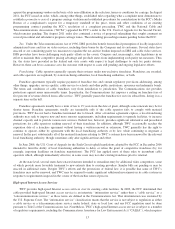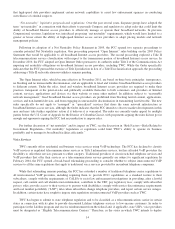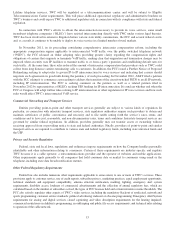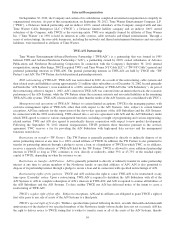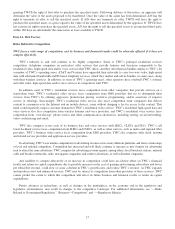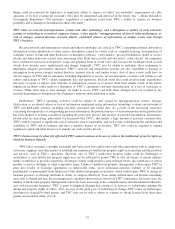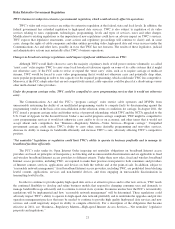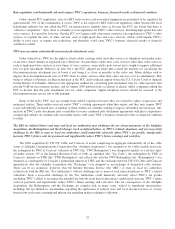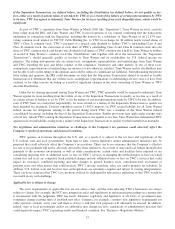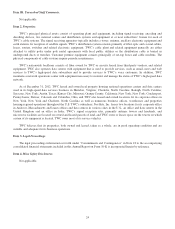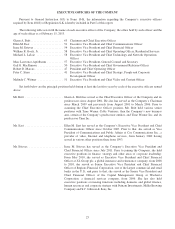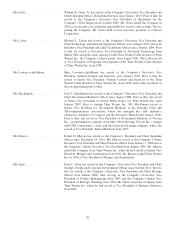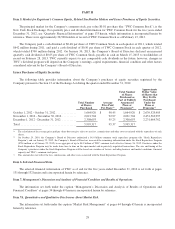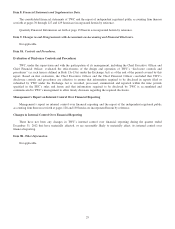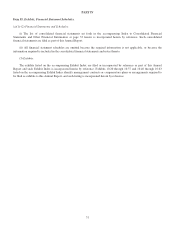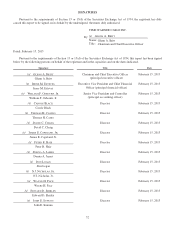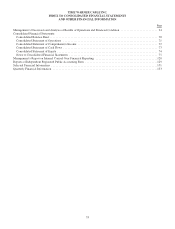Time Warner Cable 2012 Annual Report Download - page 33
Download and view the complete annual report
Please find page 33 of the 2012 Time Warner Cable annual report below. You can navigate through the pages in the report by either clicking on the pages listed below, or by using the keyword search tool below to find specific information within the annual report.If the Separation Transactions (as defined below), including the Distribution (as defined below), do not qualify as tax-
free, either as a result of actions taken or not taken by TWC or as a result of the failure of certain representations by TWC
to be true, TWC has agreed to indemnify Time Warner for its taxes resulting from such disqualification, which would be
significant.
As part of TWC’s separation from Time Warner in March 2009 (the “Separation”), Time Warner received a private
letter ruling from the IRS, and Time Warner and TWC received opinions of tax counsel confirming that the transactions
undertaken in connection with the Separation, including the transfer by a subsidiary of Time Warner of its 12.43% non-
voting common stock interest in TW NY Cable Holding Inc. to TWC in exchange for 80 million newly issued shares of
TWC’s Class A common stock, TWC’s payment of a special cash dividend to holders TWC’s outstanding Class A and
Class B common stock, the conversion of each share of TWC’s outstanding Class A and Class B common stock into one
share of TWC common stock, and the pro-rata dividend of all shares of TWC common stock held by Time Warner to holders
of record of Time Warner’s common stock (the “Distribution” and, together with all of the transactions, the “Separation
Transactions”), should generally qualify as tax-free to Time Warner and its stockholders for U.S. federal income tax
purposes. The ruling and opinions rely on certain facts, assumptions, representations and undertakings from Time Warner
and TWC regarding the past and future conduct of the companies’ businesses and other matters. If any of these facts,
assumptions, representations or undertakings are incorrect or not otherwise satisfied, Time Warner and its stockholders may
not be able to rely on the ruling or the opinions and could be subject to significant tax liabilities. Notwithstanding the private
letter ruling and opinions, the IRS could determine on audit that the Separation Transactions should be treated as taxable
transactions if it determines that any of these facts, assumptions, representations or undertakings are not correct or have been
violated, or for other reasons, including as a result of significant changes in the stock ownership of Time Warner or TWC
after the Distribution.
Under the tax sharing agreement among Time Warner and TWC, TWC generally would be required to indemnify Time
Warner against its taxes resulting from the failure of any of the Separation Transactions to qualify as tax-free as a result of
(i) certain actions or failures to act by TWC or (ii) the failure of certain representations made by TWC to be true. In addition,
even if TWC bears no contractual responsibility for taxes related to a failure of the Separation Transactions to qualify for
their intended tax treatment, Treasury regulation section 1.1502-6 imposes on TWC several liability for all Time Warner
federal income tax obligations relating to the period during which TWC was a member of the Time Warner federal
consolidated tax group, including the date of the Separation Transactions. Similar provisions may apply under foreign, state
or local law. Absent TWC causing the Separation Transactions to not qualify as tax-free, Time Warner has indemnified TWC
against such several liability arising from a failure of the Separation Transactions to qualify for their intended tax treatment.
Tax legislation and administrative initiatives or challenges to the Company’s tax positions could adversely affect the
Company’s results of operations and financial condition.
TWC operates in locations throughout the U.S. and, as a result, it is subject to the tax laws and regulations of the
U.S. federal, state and local governments. From time to time, various legislative and/or administrative initiatives may be
proposed that could adversely affect the Company’s tax positions. There can be no assurance that the Company’s effective
tax rate or tax payments will not be adversely affected by these initiatives. As a result of state and local budget shortfalls due
primarily to the economic environment as well as other considerations, certain states and localities have imposed or are
considering imposing new or additional taxes or fees on TWC’s services or changing the methodologies or base on which
certain fees and taxes are computed. Such potential changes include additional taxes or fees on TWC’s services that could
impact its customers, combined reporting and other changes to general business taxes, central/unit-level assessment of
property taxes and other matters that could increase TWC’s income, franchise, sales, use and/or property tax liabilities. In
addition, U.S. federal, state and local tax laws and regulations are extremely complex and subject to varying interpretations.
There can be no assurance that TWC’s tax positions will not be challenged by relevant tax authorities or that TWC would be
successful in any such challenge.
Applicable law is subject to change.
The exact requirements of applicable law are not always clear, and the rules affecting TWC’s businesses are always
subject to change. For example, the FCC may interpret its rules and regulations in enforcement proceedings in a manner that
is inconsistent with the judgments TWC has made. Likewise, regulators and legislators at all levels of government may
sometimes change existing rules or establish new rules. Congress, for example, considers new legislative requirements for
cable operators virtually every year, and there is always a risk that such proposals will ultimately be enacted. In addition,
federal, state or local governments and/or tax authorities may change tax laws, regulations or administrative practices that
could negatively impact TWC’s operating results and financial condition. See “Business—Regulatory Matters.”
23


